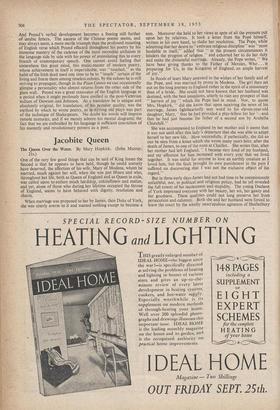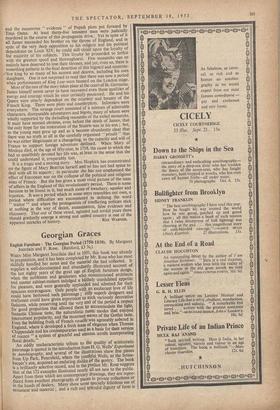Jacobite Queen
ONE of the very few good things that can be said of King James the Second is that he appears to have held, though he could scarcely have deserved, the affection of his wife, Mary of Modena, whom he married, much against her will, when she was just fifteen and who, throughout her life, both as Queen of England and as Queen in exile, was called upon to endure much hardship, unkindliness and malice, and yet, alone of those who during her lifetime occupied the throne of England, seems to have behaved with dignity, resolution and charm.
When marriage was proposed to her by James, then Duke of York, she was utterly averse to it and wanted nothing except to become a nun. Moreover she held to her views in spite or all the pressure ptit upon her by relatives. It took a letter from the Pope himself, written in his own hand, to shake her resolution. The Pope, while admitting that her desire to "embrace religious discipline" was "most laudable in itself," added that " in the present circumstances it hinders the progress of religion " and exhorted her to do her duty and make the distasteful marriage. Already, the Pope writes, " We have been giving thanks to the Father of Mercies, Who ... is preparing for Us, in the Kingdom of England, an ample harvest of joy."
In floods of tears Mary assented to the wishes of her family and of the Pope, and was married by proxy in Modena. The girl then set out on the long journey to England rather in the spirit of a missionary than of a bride. She could not have known that her husband was destined, with the best intentions, utterly to ruin any prospect of that " harvest of joy " which the Pope had in mind. Nor, to quote Mrs. Hopkirk, " did she know that upon receiving the news of his marriage, James lightheartedly sent word to his eleven-year-old daughter, Mary, ' that he had provided a play-fellow for her '—and that he had just become the father of a second son by Arabella Churchill."
She was accompanied to England by her mother and it seems that it was not until after this lady's departure that she was able to adapt herself to her new life. How successfully, if pathetically, she did so can be sden from a letter which she wrote many years later, after the death of James, to one of the nuns at Chaillot. She writes that, after her mother had left England, " I became very fond of my husband, and my affection for him increased with every year that we lived together. It was sinful for anyone to love an earthly creature as I loved him, but the fault brought its own punishment in the pain I suffered on discovering that I was not the exclusive object of his regard."
But in these early days James had not had time to be conspicuously unfaithful, nor, in political and religious policy, had he yet revealed the full extent of his tactlessness and stupidity. The young Duchess of York impressed everyone with her beauty, her wit, her gaiety and her goodness. These qualities could not long preserve her from persecution and calumny. Both she and her husband were forced to leave the court by the wholly unscrupulous agitation of Shaftesbury and the monstrous " evidence " of Popish plots put forward by Titus Oates. At least thirty-five innocent men were judicially murdered in the course of this propaganda drive. Yet in spite of it all James succeeded his brother on the throne of England, and in spite of the very deep opposition to his religion and his political dependence on Louis XIV, he could still count upon the loyalty of the majority of his subjects. This loyalty he proceeded to forfeit with the greatest speed and thoroughness. Few monarchs can so entirely have deserved to lose their thrones, and yet, even so, there is something pathetic in the final desertion of this bigoted and unattrac- tive king by so many of his nearest and dearest, including his own daughters. One is not surprised to read that there was now a period when performances of King Lear were banned on the London stage.
Most of the rest of the story takes place at the court of St. Germains. James himself seems never to have recovered even those qualities of energy and courage which he once certainly possessed. He and his Queen were utterly dependent on the courtesy and bounty of the French King. There were plots and counterplots. Informers were everywhere. The strange court consisted of a mixture of admirable characters, disreputable adventurers and bigots, many of whom were wholly supported by the dwindling resources of the exiled monarchs. It must have seemed obvious, even before the death of James, that the only hope for the restoration of the Stuarts was in his son ; but, as the young man grew up and as it became abundantly clear that there was no truth at all in the carefully organised " proofs " that he was either illegitimate or a changeling, so the capacity and will of France to support foreign adventure declined. When Mary of Modena died, at the age of fifty-nine, in 1718, the cause to which she had so unselfishly devoted her life was, at least in the sense that she could understand it, irreparably lost.
It is a tragic and a moving story. Mrs. Hopkirk has concentrated on the figure of Mary Beatrice herself and so has not had space to deal with all its aspects ; in particular she has not emphasised the effect of European war on the collapse of the political and religious aims of France. But she has given a most vivid picture of the state of affairs in the England of this revolutionary period. There is some heroism to be found in it, but much more of treachery, squalor and injustice. It was a period which in some ways resembles our own, a period where difficulties are encountered in defining the word " traitor " and where the protagonists of conflicting policies stick at nothing in the way of deceit, assassination, false evidence and chicanery. That out of these vexed, agitated and sordid years there should gradually emerge a strong and united country is one of the



































 Previous page
Previous page